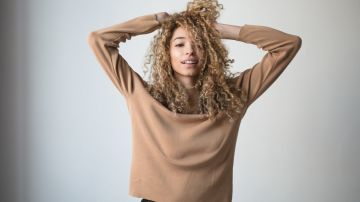Why the Curly and Natural Hair Movement Is So Important
[article_ad_lb] A few weeks ago, I found myself scrolling through my Facebook feed, only to find a post a friend shared regarding the significance of the curly/natural hair movement

Photo: Unsplash/@thoughtcatalog
[article_ad_lb]
A few weeks ago, I found myself scrolling through my Facebook feed, only to find a post a friend shared regarding the significance of the curly/natural hair movement. She had shared an article along with her thoughts on why this movement has been so important – specifically for women of color. I was just about to share some of my similar views on the subject, when I noticed a hater commenting on her page. The woman was arguing that “hair is just hair” and that women with curly or natural hair are no different or any more important than women with much straighter textures. She clearly had missed the point. Curly-haired girls went in – myself included – and it also highlighted a much greater problem.
For many of us women with naturally curly hair – especially Black women – going natural and rocking our curls is a lot more political than it is aesthetic. It’s about being able to freely wear the hair that naturally grows from our scalps without being told we have to change it to meet society’s Eurocentric beauty standards.
That might not seem like a “big deal” for let’s say the girl who was born with straight hair and never told she couldn’t get a job for rocking the straight hair she was born with. But for women with curly or coily tresses, our hair is so much more than just that.
I am a Dominican woman with medium curly hair. It’s not tight or loose. The curl community would refer to it as a mix of 3A and 3B curls – when it’s healthy! I have the kind of curls that fall down my back once they pass shoulder length and that don’t develop a ton of shrinkage. And yet most of my life I grew up being told that as beautiful as my natural rizos were, I always looked my most polished when my hair was blown out straight. For many years I was conditioned to believe that I was my prettiest self when I was wearing my waist-long hair straight.
https://www.instagram.com/p/BXySLSWh670/?taken-by=farahpink
For my fellow Latinas and Black girlfriends with much tighter and coiler textures – the struggle has been even more real. Many of these women grew up being told that their hair was not beautiful and that they had to relax it straight in order to look “presentable” in society. For many of these women, wearing the hair that naturally grows out of their scalps was not an option – especially when it came to job interviews, scoring careers in corporate America – even in school.
The amount of articles I have read about Black girls who have been expelled from their schools for sporting their natural hair is overwhelming. Just this year a 16-year-old Black student in Boston was asked by her school to straighten her hair because her curls went “against dress code policy.”
Last year, several South African students protested outside Pretoria Girls High School in South Africa in defense of Black girls at the school who were being discriminated against for their natural hair.
Black hairstyles were restricted in the U.S. military up until 2014. I repeat, restricted. Imagine having the hair you were born with restricted from being seen in schools, jobs, and even the military. Imagine how that would make you feel about yourself and your beauty?
But sometimes hair discrimination isn’t hella obvious. Sometimes it’s a subtle comment, like “Are you going to straighten your hair for that job interview or first date?” Messages like that give into the mentality that curly, coily, or textured hair in general isn’t beautiful or sophisticated enough to be seen in those kinds of settings. This impacts curly-haired women on both a psychological and emotional level. The curly hair movement is not just about aesthetics. It’s about being seen. It’s about being allowed to embrace our natural beauty. The beauty we were born with.
Telling a curly-haired girl she looks more beautiful with a sleek, straight blowout might seem harmless to some but it’s actually dangerous for her. The underlying (and in many cases subconscious) messages and racial stereotypes that are being pushed on her can wind up deeply impacting her self-esteem. This is why the curly hair and natural hair movement is so darn important. It gives curly-haired women (especially women of color) a voice. It reminds us that we don’t have to assimilate to mainstream Eurocentric beauty ideals in order to be considered beautiful. It reminds us that we don’t have to feel pressured or manipulated by society to straighten our hair and hide our ethnic heritage. It’s about demanding representation.
The next time someone tells you that the natural hair movement is all vanity-centered and “hair is hair,” ask them if they’ve ever felt like they couldn’t get a job for wearing the hair that naturally grows from their scalp? Then tell them that “hair is not just hair” when you’re fighting your entire life just to be able to freely embrace your identity. Period.
[article_ad]

















